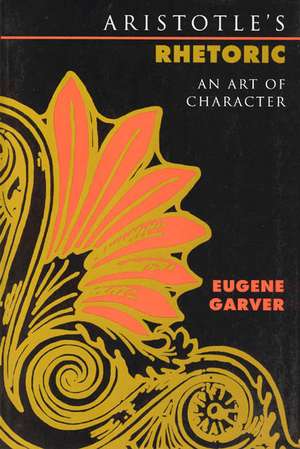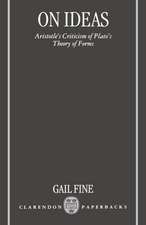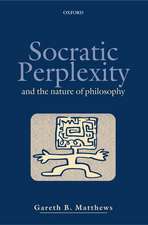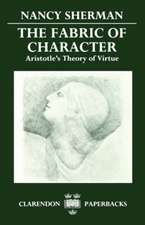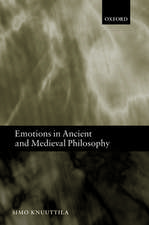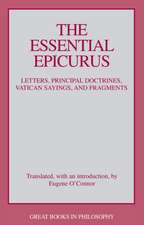Aristotle's Rhetoric: An Art of Character
Autor Eugene Garveren Limba Engleză Paperback – apr 1995
In this major contribution to philosophy and rhetoric, Eugene Garver shows how Aristotle integrates logic and virtue in his great treatise, the Rhetoric. He raises and answers a central question: can there be a civic art of rhetoric, an art that forms the character of citizens? By demonstrating the importance of the Rhetoric for understanding current philosophical problems of practical reason, virtue, and character, Garver has written the first work to treat the Rhetoric as philosophy and to connect its themes with parallel problems in Aristotle's Ethics and Politics. Garver's study will help put rhetoric at the center of investigations of practice and practical reason.
Preț: 270.70 lei
Nou
Puncte Express: 406
Preț estimativ în valută:
51.80€ • 54.09$ • 42.77£
51.80€ • 54.09$ • 42.77£
Carte tipărită la comandă
Livrare economică 15-29 aprilie
Preluare comenzi: 021 569.72.76
Specificații
ISBN-13: 9780226284255
ISBN-10: 0226284255
Pagini: 333
Dimensiuni: 152 x 229 x 20 mm
Greutate: 0.47 kg
Ediția:1
Editura: University of Chicago Press
Colecția University of Chicago Press
ISBN-10: 0226284255
Pagini: 333
Dimensiuni: 152 x 229 x 20 mm
Greutate: 0.47 kg
Ediția:1
Editura: University of Chicago Press
Colecția University of Chicago Press
Cuprins
Acknowledgments
Introdcution: Aristotle's Rhetoric and the Professionalization of Virtue
I. Aristotle's Rhetoric: Between Craft and Practical Wisdom
Aristotle's Project: A civic, Practical Art of Rhetoric
Guiding vs. Given Ends
From Internal/External Ends to Energeia/Kinesis
Rhetoric and Phronesis
Civic vs. Professional Arts
II. The Kinds of Rhetoric
The Plurality of Practical Discourse and the Diversity of Goods
Plurality, Function, and the Three Kinfs of Rhetoric
Plurality, Diversity, and the Incommensurablility
From Guiding Ends to Species
III. Rhetorical Topics and Practical Reason
Topics and the Marriage of Politics and Dialectic
Deliberative Rhetoric: Rhetoric
Epideictic Rhetoric: Rhetoric
Topics and Practical Reason
IV. Deliberative Rationality and the Emotions
Corrupting and Enabling Emotions
The Place of the Emotions in Rhetorical Arugment
Love and Anger, Eunia and Thymos
Aristotle's Definition of Emotion: How Emotions Modify Judgment
Pleasure, Pain, and Good Practical Decisions
The Political Function of Emotion
The Emotions, Good Action, and the Good Life
V. Why Reasoning Persuades
Arguing and Persuading
Arguing and Persuading: Ethos and Trust
Logical Forma and Rhetorical Forms
How Examples Persuade
How Enthymemes Persuade
Rhetorical Persuasion and Practical Reason
VI. Making Discourse Ethical: Can I Be Too Rational?
The Problem and the Evidence
Character and Rhetorical Invention
Why Rhetorical Needs Ethos
Ethos and Trust: SPeaker and Audience
Artful Ethos and Real Ethos
How Maxims Make Discourse Ethical
Rhetoric, Cleverness, and Phronesis
VII. How to Tell the Rhetorician from the Sophist, and Which One to Bet On
Energeia and Praxis
The Internal Ends of Art and Virtue
The Art and Virtue of Truth-telling
The Moral Point of View and the Rhetorical Point of View
The Moral Ambiguity of Rhetoric, and the Moral Ambiguity of Morality
VIII. Aristotle's Rhetoric and the History of Prudence
Notes
Bibliography
Index to Passages from Aristotle
General Index
Introdcution: Aristotle's Rhetoric and the Professionalization of Virtue
I. Aristotle's Rhetoric: Between Craft and Practical Wisdom
Aristotle's Project: A civic, Practical Art of Rhetoric
Guiding vs. Given Ends
From Internal/External Ends to Energeia/Kinesis
Rhetoric and Phronesis
Civic vs. Professional Arts
II. The Kinds of Rhetoric
The Plurality of Practical Discourse and the Diversity of Goods
Plurality, Function, and the Three Kinfs of Rhetoric
Plurality, Diversity, and the Incommensurablility
From Guiding Ends to Species
III. Rhetorical Topics and Practical Reason
Topics and the Marriage of Politics and Dialectic
Deliberative Rhetoric: Rhetoric
Epideictic Rhetoric: Rhetoric
Topics and Practical Reason
IV. Deliberative Rationality and the Emotions
Corrupting and Enabling Emotions
The Place of the Emotions in Rhetorical Arugment
Love and Anger, Eunia and Thymos
Aristotle's Definition of Emotion: How Emotions Modify Judgment
Pleasure, Pain, and Good Practical Decisions
The Political Function of Emotion
The Emotions, Good Action, and the Good Life
V. Why Reasoning Persuades
Arguing and Persuading
Arguing and Persuading: Ethos and Trust
Logical Forma and Rhetorical Forms
How Examples Persuade
How Enthymemes Persuade
Rhetorical Persuasion and Practical Reason
VI. Making Discourse Ethical: Can I Be Too Rational?
The Problem and the Evidence
Character and Rhetorical Invention
Why Rhetorical Needs Ethos
Ethos and Trust: SPeaker and Audience
Artful Ethos and Real Ethos
How Maxims Make Discourse Ethical
Rhetoric, Cleverness, and Phronesis
VII. How to Tell the Rhetorician from the Sophist, and Which One to Bet On
Energeia and Praxis
The Internal Ends of Art and Virtue
The Art and Virtue of Truth-telling
The Moral Point of View and the Rhetorical Point of View
The Moral Ambiguity of Rhetoric, and the Moral Ambiguity of Morality
VIII. Aristotle's Rhetoric and the History of Prudence
Notes
Bibliography
Index to Passages from Aristotle
General Index
